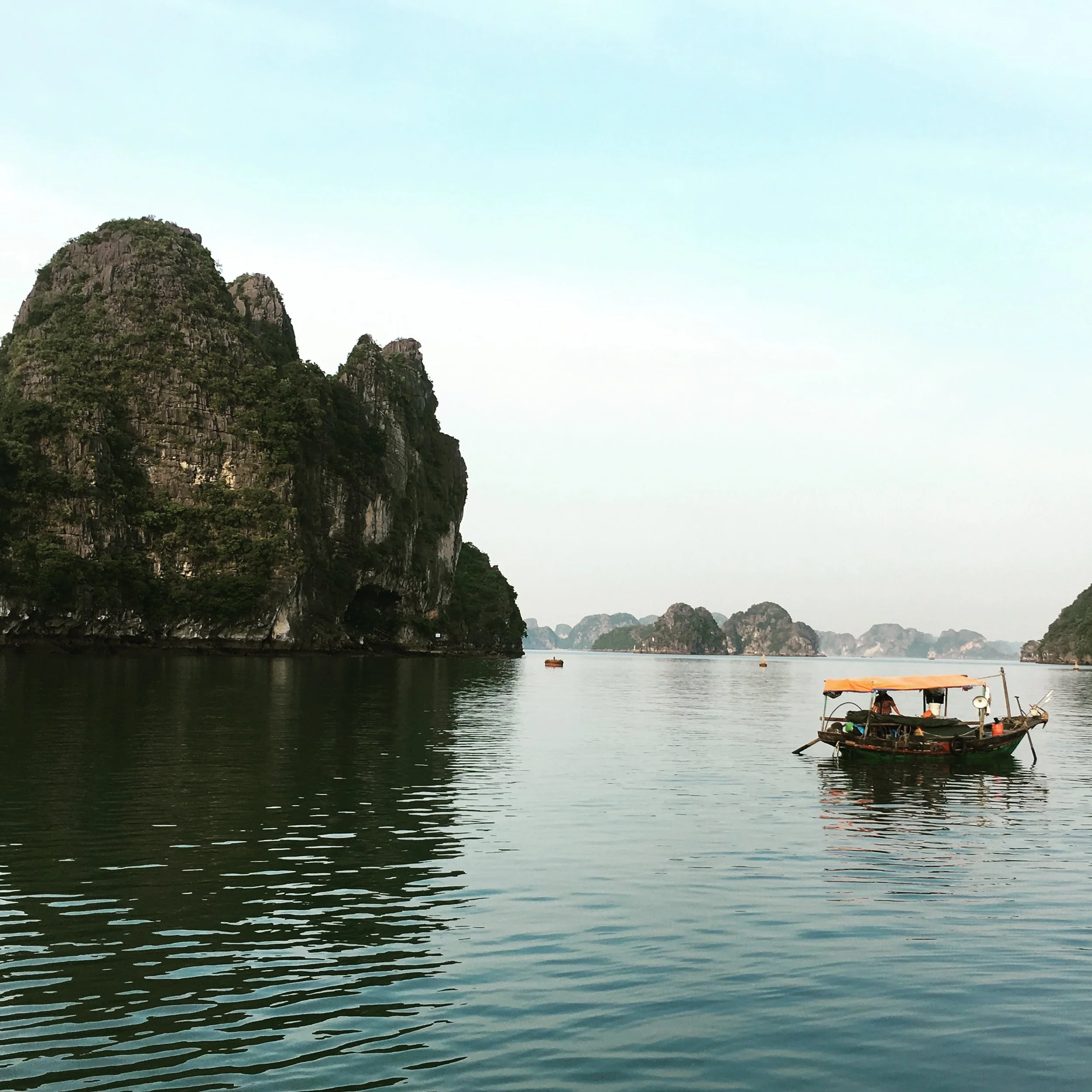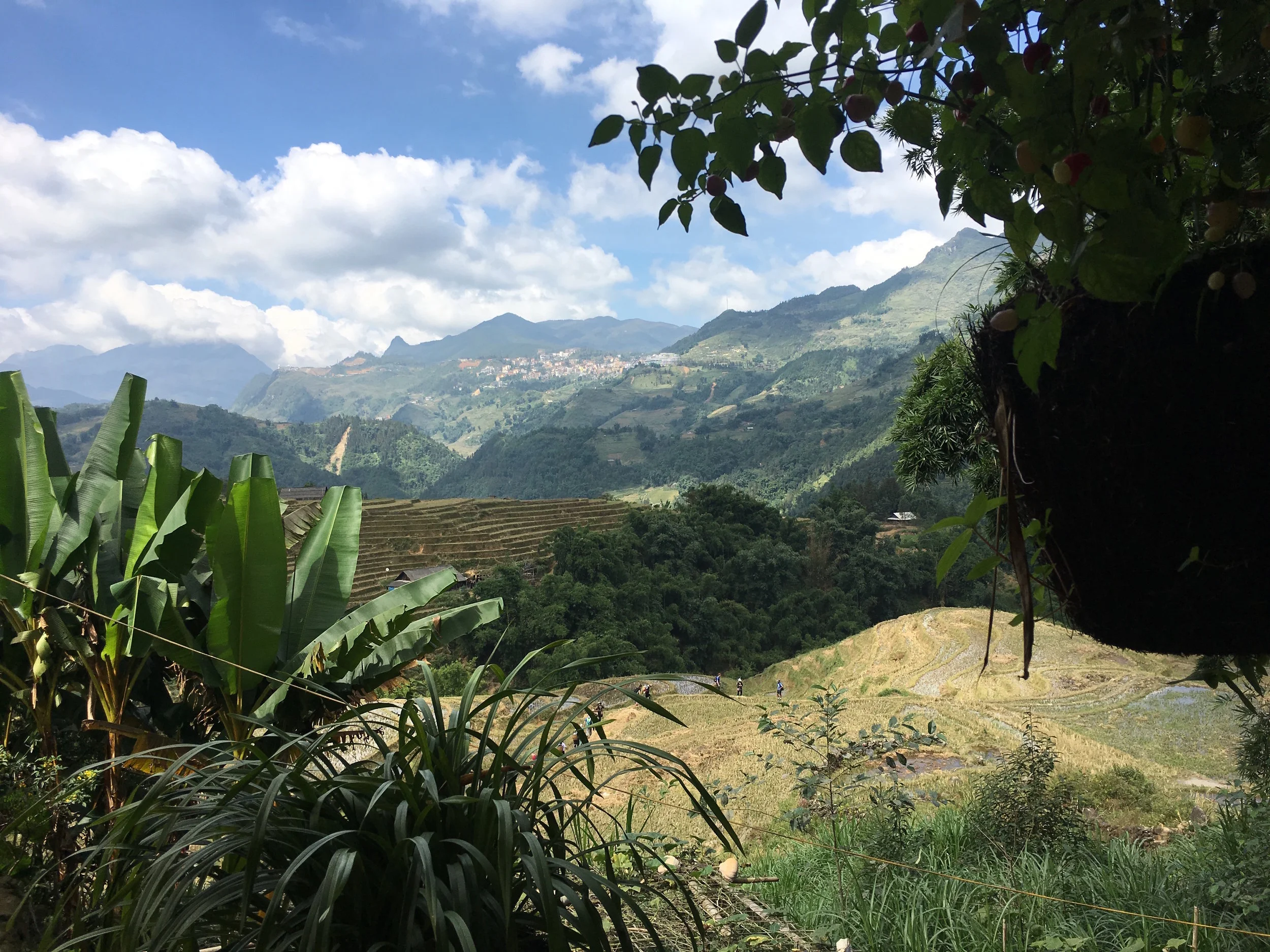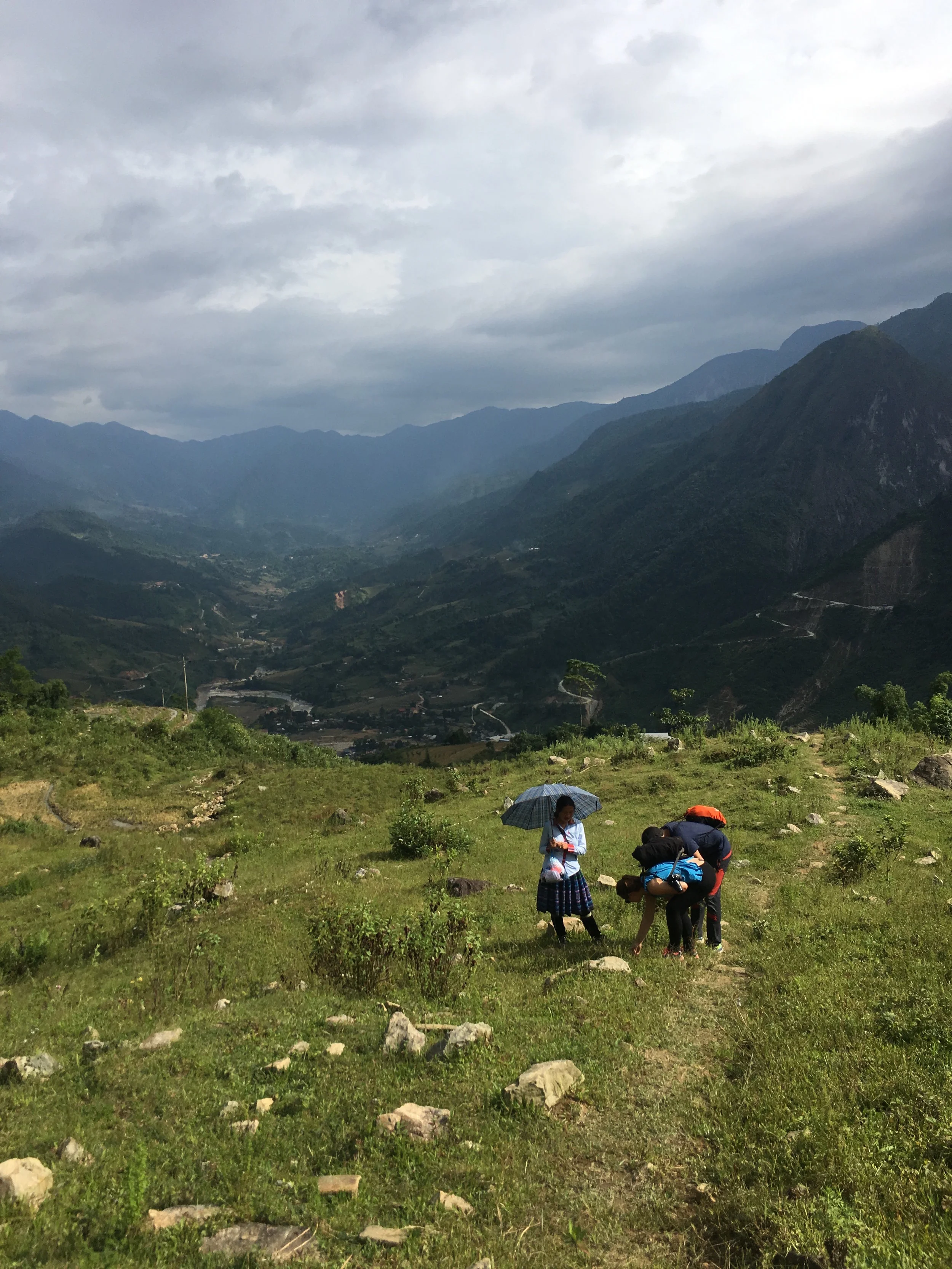Ethnic Travel (Sa Pa to Ha Long Bay)
Having found our way to the alleyway, to the Ethnic Travel (Lonely Planet – referred) office, we were received warmly with a cup of warm Vietnamese tea. We had intention of booking our trip to Ha Long Bay, but left with much more. In the span of about 20 minutes, on our second day in Hanoi, we’d managed to have the agent book our trip to Sa Pa, Ha Long bay, the connection that would take us from one to the other, and the flight that would take us from Hanoi to Da Nang/Hoi An, where we currently reside. And reside, I am taking very seriously.
Our final day in Sa Pa began with a breakfast at our home stay with a group of people we’d loosely met off and on, as we navigated our way down the trail. A company of French, Spanish, and a couple New Yorkers all had the opportunity to lightly trek on the warm morning to the waterfalls, where we could swim and relax before lunch, and before we would take the 1 hour ride back to Sapa (town).
As I “always” do, I made a Ball State connection with someone whose mother went to the school. Talking with a couple who’d just left New York City, and were planning on traveling for nine months (yes, I know…nine months), I told the one woman where I was from and she, as I state always with emphasis because Rebecca is a bit, I’ll say: critical, of my use of the word…she said: “my mom went to Ball State!”
“Me too!” I said.
Anyway, following the cool bath in the mountain river water fall, with rocks too slippery to stand on for too long, we made our way back to the Ban Ho home stay, grabbing a sugar cane juice along the way.
The ride back to Sa Pa was treacherous, and we passed many of the villages and trails, rice fields, and children that we’d trudged passed on our way to Ban Ho. I reflected a bit as I tried to make out our trail from the mountain-side pass we took. Noting all the smiles, the missed steps that lead to us catching ourselves before tumbling down the mountainside, then to the feisty ladies attempting to sell us their hand bags, to the taste of that first Lao Cai beer after the long-first-day of trekking. I’ll never quite get these experiences out of my memory, and especially the people who gave me yet another example of how people live in yet another part of the world.
That night as we departed our new Spanish friends (finally learning everyone’s names: Irene and Javier), we ate one of the warmest meals I’ve ever experienced (and I mean warm in that the restaurant reminded me of my bedroom on summer afternoons when I was a kid in Indiana…hot, stale and humid). We boarded the train back to Hanoi, met our bunk mates who were from Düsseldorf-area, shared a couple of Hanoi beers before we passed out.
Waking at 5:30 as the train screeched and belched, honking motorbikes seemingly back outside our window…back in the city where it seems that no one ever goes to sleep. Vietnamese, I am told, are early risers, and I believe it. We made our way to the Mango hotel where we met a family, and another daughter and father all from England. The one group who we’d passed back and forth on the trails of Sa Pa were enjoying a few last days in Vietnam, after the couple was ending their year of working in Hanoi. Displeased with a friend who’d mis-sold Hanoi to them, she said, the traffic, griminess, and general feel of the city had become too much soon after their commitment to work teaching English. The father and daughter who we’d get to spend a day or so with in Ha Long Bay, were visiting for the first time in some months. She was now living and working in Singapore, and he was visiting her for a month or so, from Birmingham.
“It’s Birming-um.” he reminded me. “Not Birming-ham.”
I reminded him I’d lived in London for a period of time, and had a professor who was also from Birmingham, and he too would remind us Americans of the proper pronunciations of such things, places, types of sausage/pudding, etc.
Collecting a few more couples at the ethnic travel office before driving three hours or so to the Ha Long port, I noted along the way that like L.A. the city never really ends. From the get-go, the energy is strangely awkward and silent in our shuttle. This theme sticks to a majority of the next 24 hours, so things do thaw slightly as we depart from each other the next afternoon.
We’re an English father and daughter, a very friendly Belgian architect and his very friendly girlfriend – who we’d be with for the next 48 hours – a female couple from Paris, a female couple from England who smoke every chance they get, and an older French couple who mostly just keep to themselves and are quite affectionate.
We board an old cruiser that contains eight cabins and a top viewing level with no shade making it unbearably hot when the boat isn’t cruising. I figure perhaps that the shade band that seems to reside on every boat except ours, must have blown away during the typhoon-force winds of the day or so earlier. It’s too hot to sit for too long anywhere on the deck, so we crowd (quietly) into the second level dining and common area that drones Vietnamese television news, and has one circulating fan that too nods its disapproval of the situation by it’s own mechanical struggle.
The burnout from the “crew” is evident but the food at lunch time is quite lovely; an assortment of seafood, rice and salad. As we finish lunch, the boat has made its way out of the harbor and is now passing some of the famous limestone karsts. They seem endless into the horizon, like great monuments jutting silently from the greenish-water of the bay. Thinking of the timelessness of this place, I reckon that the ancient Chinese to the French, to the modern day cruises, or the fishing boats – seemingly stuck in time themselves – all witnessed similarly to the majesty of this place.
We anchor for a brief time, then pile into kayaks. Two-by-two, I decide to go rogue, and when I do, I skip ahead and fight with paddling Rebecca, as I attempt to “save” a hat from one of the limestone walls. I paddle closer and she yells for me to stop. I pull harder, to pull up close enough to one of the karst walls to fish the hat off one of the limestone stalagmites. As I get my oar, finally, under the hat, the string snaps, and it – sadly – flips over, out of reach. Rebecca is thrilled. I am defeated.
Dinner ends up being one of the best meals I’ve ever had. And not simply because of the food, itself. What makes it great is the experience, and the irony /beauty of the close quarters, abundance of sea food, and that “the captain” – as I’ve begun calling him, who directs the boat wheel with his feet – stands behind us with small tongs waiting, waiting, until that very moment we finish a shrimp, or a crab or a piece of fish; to grab a bone or any residue of food waste with his tongs, and move it off our tiny plates. It’s quite humorous. We all share in the amusement – silently enjoying the awkwardness of his diligence.
Before dinner, as the sun rested behind our nearest island, our guide sat down on the deck next to me, and began, almost in a child-like way, asking what I was writing. I told him of Sapa, and then he began explaining of his own experience in growing up in a Hmong community, in the mountains near Ba Be National Park, and his struggles relating to growing up with little, and his quiet efforts to make a good life. He hinted, but wasn’t overt at what I perceived to be a strange negativity around the reality of tourism and how it has changed the way of life in Sapa.
Children, he noted, are often left alone and not cared for by their mothers due to their work in selling items on the trails to tourists. He noted seeing, when walking to and from school, children, lying or sleeping in or along the road side because no one was around to look, or care for them. A hint of sadness that has befallen an outwardly jovial community of people seemed unlikely to what was presented to us, but made sense to me as I thought about it. I reflected momentarily that though it is enjoyable, and often insightful to tour areas known for beauty, and differing ways of life, it seems not always productive or constructive for the people who one meets from those native communities.
He said he spent his teen years walking on weekends to and from school (27-28 km) on weekends. He would come home from the school to collect rice, vegetables, and other food to eat during the week where he’d share a small room to sleep, with 10 other people. He said it was necessary to go home each weekend, because he needed the food, and he was required to help his family (of 12) with the farming or harvest. He kept beginning to ask about our lives, which seemed so trivial and privileged, I thought, as he talked and we questioned. But, continuing he began talking about working with Ethnic Travel and hesitated when I asked if he liked working at this particular job. He nodded yes, but that he’d like a day off after working each day for more than four months.
We ended the night continuing to chat quietly amongst ourselves, following dinner, enjoying the thick night area in the still solitude of the bay, surrounded by all those the karst giants. Retiring to bed, we closed our cabin door, and flipped on the air conditioning.
Privileged indeed, I thought, as I drifted to sleep.






